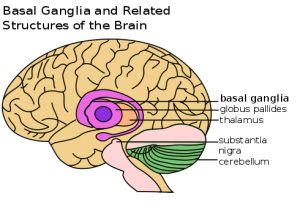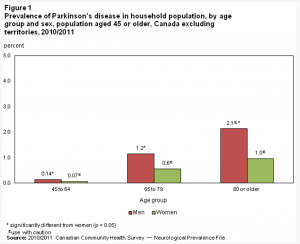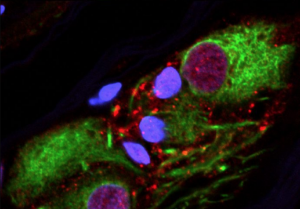Do you know someone that has Parkinson’s Disease? Did you know that there are more than 10 million people around the world that suffer from this disease, but there is still no cure?
A recent study has discovered what could be a therapy for Parkinson’s Disease, but it is quite unconventional! Keep reading to find out more.
To provide some background information, Parkinson’s Disease (PD) is a “neurodegenerative disorder”, which means that it causes serious damage to the nerves of the brain. Symptoms of the disease include hand tremors, extreme difficulty walking as well as mental problems such as hallucinations or delusional thoughts. The disease typically affects people over the age of 50.

Diagram of the “Basal Ganglia”, which is the part of the brain affected by Parkinson’s Disease. Source: Wikimedia Commons. This image is part of the public domain.
Now, the good news! A group of researchers at Iowa State University have been investigating the effects of singing therapy on a group of PD patients, and found that the participants’ heart rate, blood pressure, as well as self-reported anxiety and sadness decreased over the 2.4-year-long treatment period. These results show that the overall health and well-being of the participants improved as a result of the therapy!
What is “singing therapy”, you ask? Essentially, the treatment is weekly or bi-weekly, and consists of sessions in which the PD patients undergo vocal exercises and sing well-known songs as a group. Researchers found that the PD patients were able to breathe more effectively after the therapy!
You might be wondering how singing could possibly affect such a complicated disease, but as lead investigator Elizabeth Stegemoller describes it,
“We’re not trying to make them better singers, but to help them strengthen the muscles that control swallowing and respiratory function. We work on proper breath support, posture and how we use the muscles involved with the vocal cords, which requires them to intricately coordinate good, strong muscle activity.”
Essentially, singing therapy is beneficial to PD patients because it helps them strengthen the muscles used for swallowing and breath control, which are tasks that become difficult with the onset of the disease.
In addition to these benefits, the study found that the patients experienced improvements in their tremors and walking.

A depiction of a PD patient drawn by neurologist Sir William Richard Gowers in 1886. This image is currently used by the medical community as a reference for the symptoms of PD. Source: Wikimedia Commons. This image is part of the public domain.
Looking to the future, researchers are hopeful that singing therapy will be implemented as a clinical treatment for PD patients, as it is cheap, extremely low-risk, and lots of fun!
Watch this YouTube video (published by Iowa State University and available as part of the public domain) to find out more about the Parkinson’s Disease research being conducted by Elizabeth Stegemoller at Iowa State University.
Maya Liepert



